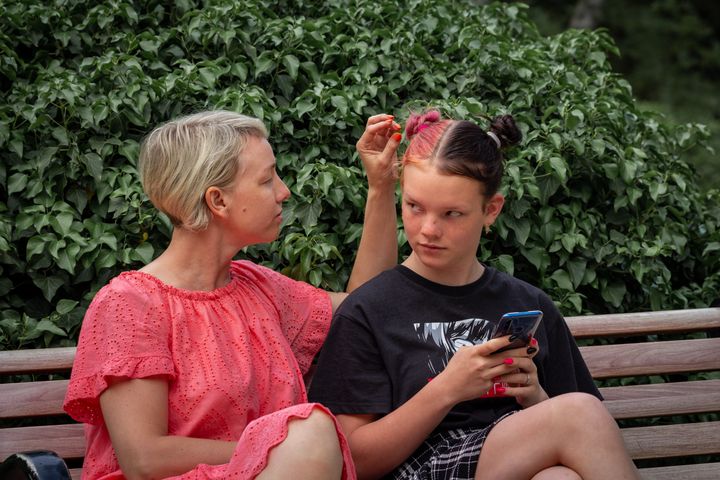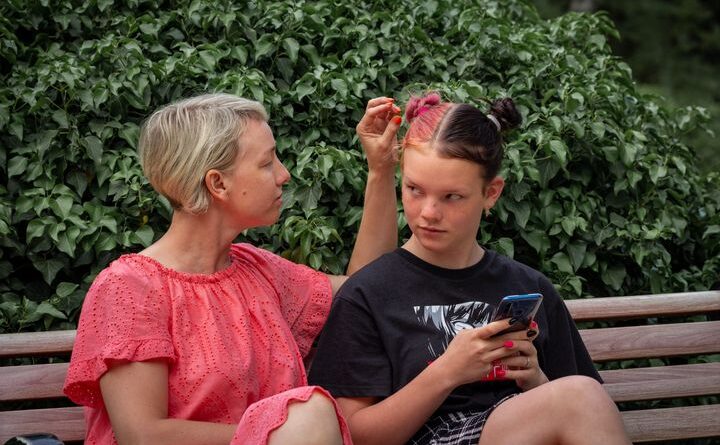Everyone Blames Gen Z’s Anxieties on Parents – But We’re Not to Blame
A friend recently called me crying: Her son, who just started college, was scared. “It’s all my fault!” he cried. Her comment: She let him sleep in her bed as a baby when she cried, so it must be causing her separation anxiety today. At least that’s what his Google articles about youth and anxiety said.
I understand why he feels guilty. The media likes to point the finger at moms and dads (especially moms) because Gen Z is the most burdened generation of all. And everyone I know has read Jonathan Haidt’s bestseller 2024, “A Troubled Generation: How Child Abuse is Causing an Epidemic of Mental Illness. ” In it, a social psychologist asserts that parents are reluctant to allow children to use social media but are very protective of their real lives. We parents are “on the defensive,” he writes, seeing dangers and threats everywhere. His 2018 book, “The Coddling of the American Mind: How Good Intentions and Bad Ideas Create a Generation of Failure,” it goes even further: It accuses parents of raising children in a safe way and setting them up for failure.
This summer, an American surgeon, Dr. Vivek Murthy, issued a warning about parents’ mental health, citing research by the American Psychological Association that found 48% of parents feel their stress is present. carelessness. Stressed parents make stressed children more vulnerable to depression and anxiety, he wrote in a New York Times editorial. But he didn’t throw us under the bus completely. He issued a call for action, asking that public policy and society as a whole do more to support parents and carers.
I’ll admit it: Some of us take the helicopter parent thing a little too seriously. I remember when a mother stopped me in the schoolyard before her 10-year-old son came to play. He had a list to check. “You don’t have any guns, do you?” he asked. “No medicine lying around? Open bottles of liquor?” At the time, I was taking it. Did I look like someone with a Glock or a day drinker? But now I realize he was just out of line. He was without knowing me, and she was making sure that her child was in good hands.
I tried to do the same in my primary and teenage years. I took my cheating daughter with me and sifted through her candy to make sure it didn’t spill. I picked him up from ballet classes, play rehearsals and parties instead of letting him get into an Uber or (worse!) take the train alone. When he was in college, I asked him to text me to let me know if the Hinge date he met for drinks wasn’t a killer. Does this make me a bad parent or the reason he came out of hell in 2020 with anxiety? I do not think so. I also don’t think any parent harms their child by loving and caring so much.

Parents are human, and we do the best we can in this crazy and increasingly stressful world. Terrorism on US soil, school shootings, COVID-19, deep lies, Diddy’s impeachment – don’t even get me started on politics and mpox. Our parents never knew about such things. My mom let me ride my bike home from my best friend’s house after dark in our neighborhood in the Bronx. He was not worried that other aggressive animals would hug me, molest me or sexually assault me. We didn’t have cell phones, much less AirTags or tracking systems. My parents were happy not realizing that danger could be everywhere. Or maybe it wasn’t then? The 1970s and 80s seemed like a simpler, simpler time.
We are parents who lived through the tragedy and tragedy of 9/11. We have seen angry mobs attack the US Capitol and the mass shooting at Sandy Hook Elementary. If life made us fiercely protective lions protecting our cubs, we have a good reason. It’s the world out of control – not the parents.
When I was a kid and I found money on the street, I took it and went straight to the candy store. Today, I watched as a mother spanked her child in Central Park when she found a dollar bill lying on the sidewalk. “Don’t touch that!” he shouted, removing his small hand. “It could have fentanyl in it and kill you!”
Support Free Journalism
Support HuffPost
Are you already involved? Log in to hide these messages.
Mindie Barnett, a worried mother of a 16-year-old daughter, says: “It’s a constant stream of news for parents. It’s one thing after the next, a constant stream of conflict and warnings coming at us.” Barnett, who is a behavioral assistant at Jersey Innovative mental health services, says advise children, youth and families. He says parents are not the cause of Gen Z’s mental health crisis. . Forgive yourself and know that every parent makes mistakes. As long as you love your children and talk to them, give them what they need, they will find their way.”
Psychologist and author Robi Ludwig says society has been blaming parents for what goes wrong with their children. “Perhaps this is rooted in the historical roots of Freudian psychology, which has a strong influence on the way we view the parent-child relationship.” Freud believed that experiences in the first few years of life, especially interactions with parents or caregivers, it ultimately shapes the individual’s personality.
But in the end, guilt solves nothing. Stress is complex and has many sources, including natural, environmental and social. Instead of trying to analyze who, what and what is to blame, Ludwig advises that parents help children recognize the signs of anxiety in themselves as well as understand that it is a natural response to stress. feelings. “One of the best things you can do is be a good role model,” he says. “Show good ways to deal with stress and anxiety, which can set a good example.”
Parents and children can “work together to create a plan to manage anxiety and situations that cause anxiety,” she adds. “This can help them build confidence and reduce their fear and uncertainty.”
#Blames #Gen #Anxieties #Parents #Blame
